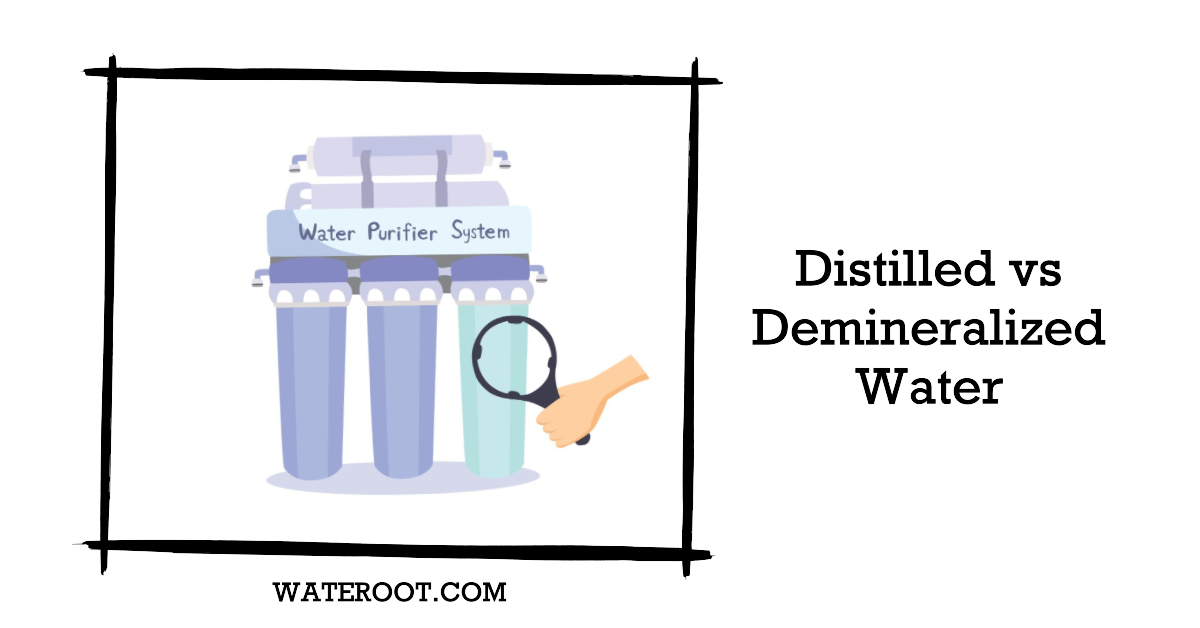As consumers, we often come across various types of water in the market, each claiming to offer distinct benefits. Two such types are distilled water vs demineralized water. While these terms may sound similar, they actually refer to different processes and end products. In this article, we will demystify the differences between distilled water and demineralized water, exploring their production methods, properties, and uses. By understanding these distinctions, you will be able to make an informed decision about which type of water suits your needs best.
What is distilled water?
Distilled water is a type of purified water that has undergone a specific distillation process to remove impurities and contaminants. The process involves heating water to its boiling point, capturing the steam, and then condensing it back into liquid form. This method effectively separates water molecules from any dissolved minerals, impurities, or other substances present in the original water source.
How is distilled water produced?
Distilled water is produced using a distillation apparatus, which typically consists of a boiling chamber, a condenser, and a collection container. The water is heated in the boiling chamber until it reaches its boiling point, causing the water to vaporize as steam. The steam rises and moves into the condenser, where it cools and transforms back into liquid water. This condensed water is then collected in the container, resulting in distilled water.
The distillation process removes a wide range of impurities, including bacteria, viruses, minerals, chemicals, and heavy metals. As a result, distilled water is considered one of the purest forms of water available.
Properties and uses of distilled water
Distilled water has several distinct properties that make it suitable for various applications. Firstly, it has a neutral pH level, meaning it is neither acidic nor alkaline. This makes it ideal for use in medical procedures, laboratories, and certain industrial processes where precise pH levels are crucial.
Secondly, distilled water is free from minerals, which can be advantageous in certain situations. For example, it is commonly used in automotive cooling systems, as the absence of minerals reduces the risk of mineral buildup and corrosion. Distilled water is also used in steam irons and humidifiers to prevent the accumulation of mineral deposits.
Thirdly, distilled water lacks any taste or odor, making it preferable for those who do not enjoy the distinct flavor of tap water. Additionally, it is often used in the preparation of infant formula to ensure the absence of any potentially harmful substances.
What is demineralized water?
Demineralized water, also known as deionized water, undergoes a different purification process compared to distilled water. While distilled water focuses on removing impurities through distillation, demineralized water aims to eliminate mineral ions by using ion exchange resins or other specialized filtration methods. The goal is to reduce the concentration of dissolved minerals to extremely low levels, resulting in highly purified water.
How is demineralized water produced?
The production of demineralized water typically involves passing the water through a series of ion exchange resins or filtration systems. These resins or filters contain exchangeable ions that attract and capture mineral ions present in the water. As the water passes through the system, the mineral ions are replaced with hydrogen and hydroxyl ions, resulting in demineralized water.
It is important to note that demineralized water may not be as pure as distilled water, as it may still contain certain impurities that are not effectively removed by the ion exchange process. However, it is still considered highly purified and suitable for many applications.
Properties and uses of demineralized water
Demineralized water shares some properties with distilled water, as both are purified and free from minerals. However, due to the different production processes, there may be slight variations in the properties of demineralized water.
Like distilled water, demineralized water has a neutral pH level, making it useful in industries that require precise pH control. It is commonly utilized in laboratories, pharmaceutical manufacturing, and electronics production, where the presence of minerals can interfere with sensitive processes.
Demineralized water is also preferred for battery maintenance, as the absence of minerals reduces the risk of mineral deposits on battery plates. Additionally, it is used in certain types of steam generation systems, where the presence of minerals can lead to corrosion or scaling.
Distilled Water vs Demineralized Water: What sets them apart?
Now that we have explored the definitions, production methods, and properties of both distilled water and demineralized water, let’s delve into the key differences between them.
Firstly, the main distinction lies in the purification processes. Distilled water is produced through distillation, which involves heating and condensing water to remove impurities, while demineralized water is created by removing mineral ions using ion exchange resins or specialized filters.
Secondly, the level of purity may differ between the two types of water. Distilled water is considered one of the purest forms of water, as it effectively removes a wide range of impurities, including minerals. Demineralized water, on the other hand, may still contain certain impurities that are not completely eliminated by the ion exchange process.
Thirdly, the applications of distilled water and demineralized water vary. Distilled water finds applications in medical procedures, laboratories, automotive cooling systems, steam irons, humidifiers, and the preparation of infant formula. Demineralized water, due to its extremely low mineral ion concentration, is commonly used in laboratories, pharmaceutical manufacturing, electronics production, battery maintenance, and certain steam generation systems.
Is distilled water demineralized?
Yes, distilled water can be considered demineralized. The distillation process removes minerals and other impurities from the water, resulting in a highly purified product. Therefore, distilled water can be classified as a type of demineralized water.
Is filtered water demineralized?
Filtered water, depending on the filtration method used, may or may not be considered demineralized. While certain filtration systems can effectively remove impurities and minerals from water, others may only remove larger particles or contaminants. It is important to understand the specific filtration process and its capabilities to determine whether the filtered water can be classified as demineralized.
Choosing between distilled water and demineralized water
When it comes to choosing between distilled water and demineralized water, consider your specific needs and requirements. If you require the purest form of water for medical procedures, laboratory experiments, or infant formula preparation, distilled water may be the ideal choice. On the other hand, if you need highly purified water for applications such as electronics production, battery maintenance, or steam generation systems, demineralized water may be more suitable.
It is also worth noting that both distilled water and demineralized water can be purchased commercially, making them easily accessible for various purposes. Consider the availability and cost of each type of water when making your decision.
Conclusion
In conclusion, distilled water vs demineralized water are two distinct types of purified water, each produced through different processes and offering unique properties. Distilled water is created by distillation, effectively removing impurities and minerals, making it suitable for various applications. Demineralized water, produced through ion exchange or specialized filtration, reduces the concentration of mineral ions to extremely low levels, making it highly purified and suitable for specific industries.
Understanding the differences between distilled water and demineralized water allows you to make an informed decision based on your specific needs. Whether you require the purest form of water for medical procedures or highly purified water for specialized industrial applications, the choice between distilled water and demineralized water depends on the desired level of purity and the intended use.
So, the next time you come across distilled water and demineralized water, you can confidently choose the one that suits your requirements best.



